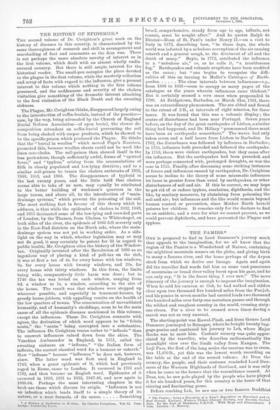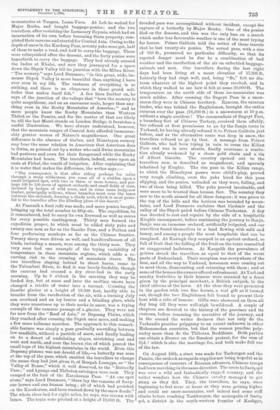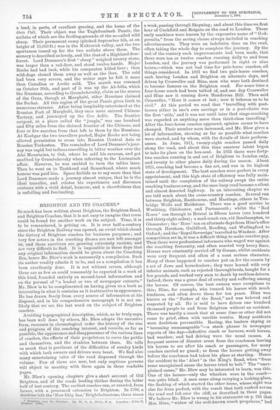THE PAMIRS.* ONE is prepared to find in Lord Dunmore's
journey much that appeals to the imagination, for we all know that the region of the Pamirs is a Wonderland of Nature, containing the mightiest mountain masses on the globe, and giving birth to many a famous river, and the home perhaps of the Aryan stock from which we derive our lineage. Again and again did the traveller find words fail him as some vast panorama of mountains or broad river valley burst upon his gaze, and he can only say, "It is the finest thing I ever saw." The mere itinerary of the journey is enough to impress the imagination. When he sold his caravan at Osh, he had walked and ridden close upon two thousand five hundred miles from the Punjab, and his ponies in seven months had carried loads two thousand two hundred miles over forty-one mountain passes and through the wildest and roughest country in the world, crossing sixty- one rivers. For a river to be crossed seven times during a march was not so very unusual.
The starting-point was Rawui-Pindi, and from thence Lord Dunmore journeyed to Srinagar, where he bought twenty bag- gage-ponies and continued his journey to Leh, where Major Roche was to meet him. Cashmir scenery was quite appre- ciated by the traveller, who describes enthusiastically the moonlight view over the Sindh valley from Kangan. The Loji Pass, the first of the long series the caravan was to cross, was 11,450 ft., yet this was the lowest worth recording on the table at the end of the second volume. At Dras the scenery, the people, and their costume reminded Lord Dun- more of the Western Highlands of Scotland, and it was only when he came to the houses that the resemblance ceased. At Dras, too, he saw polo played by the people who have played it for six hundred years, for this country is the home of that stirring and fascinating game. Before reaching Leb, he saw one or two famous Buddhist
The Pamirs being a Narrative of a Year'. Esmodition en Horseback and on Font through -Kashmir. Western Thibat. Chines, Tartar% and Russian Control Asia. By the Earl of Dunmore, F.11.4.8. With Maps awl Illustrations. 2 vols. London r J. Idurruy.
monasteries at Tasgam, Lama-Yuru. At Leh he waited for Major Roche, and bought baggage-ponies; and the two travellers, after revisiting the Lamasery Heymis, which had an incarnation of its own before becoming State property, com- pleted their caravan and started for Central Asia. 0 wing to the depth of snow in the Kardong Pass, seventy yaks were got, half of them to make a road, and half to carry the baggage. These were relinquished after the descent, and the forty ponies were henceforth to carry the baggage. They had already crossed the Indus at Khalsi, and now they journeyed for a space down the Shyok Valley till its junction with the Mibra River. "The scenery," says Lord Dunmore, "in this great, wide, im- mense Shyok Valley is more beautiful than anything I have ever seen in my life. The vastness of everything is so striking, and there is an eloquence in those grand soli- tudes that makes itself felt." A few lines further on, he says of the junction of the valleys that "here the scenery is quite magnificent, and on an enormous scale, larger than any- thing even in the Rooky Mountains of America; " and as more people know the Rooky Mountains than Western Thibet or the Pamirs, and for the matter of that are likely to, till the last Maori stands on London Bridge, it furnishes a useful illustration. We have always understood, however, that the mountain ranges of Central Asia afforded immeasur- ably greater scenes of Nature's magnificence. One great difference is the absence of timber, and Himalayan scenery may bear the same relation to American that American does to Swiss, as pointed out by a writer who said Swiss mountains had pastures and cows for their foreground while the Rooky Mountains had bears. The travellers, indeed, came upon an oasis at Firhet, the result of irrigation. After explaining that it is water that makes the difference, the writer says :- " The consequence is that after riding perhaps for miles through a stony wilderness, you come all of a sudden upon a small irrigated spot, with two or three or more houses, and per- haps 100 to 150 acres of apricot orchards and small fields of corn, inclosed by hedges of wild roses, and in some cases hedgerow timber, principally willows, whose branches meet over the lanes between the orchards, forming a shady arch, which is most grate- ful to the traveller after the blinding glare of the desert," At Panamik a final refit was made, and more ponies bought, bringing up the total number to fifty-six. The expedition, be it remembered, had to carry its own firewood as well as stores for every possible contingency. Thirty men formed the expedition proper, to which must be added sixty yaks and twenty-one men as far as the Sassihr Pass, and a Pathan and four performing monkeys as far as the Chinese frontier. Twenty sheep were driven as well, and handicraftsmen of all kinds, including a mason, were among the thirty men. They very soon had one example of the trying variability of temperature in these mountain regions, which adds a re- curring risk to the crossing of mountain rivers. The two travellers staying behind to shoot hares, came to the Talumbati River, to find it was barely fordable, though the caravan had crossed a dry river-bed in the early morning. Up to 9 o'clock in the morning they may be forded dry, but at noon and later the melting snows have changed a trickle of water into a torrent. Crossing the Sassihr glacier at a height of 18,300 feet, hardly able to breathe from the rarefaction of the air, with a burning July sun overhead and an icy breeze and a blinding glare, while they were sometimes up to their necks in snow, was a trying example of the summer passage of a glacier. They were not far now from the " Roof of Asia," or Depsang Plains, which they reached after crossing the Shyok once more, and making a few more toilsome marches. The approach to this remark. able feature was simply a pass gradually ascending between low sandhills, without a particle of snow, and finally leading on to a desert of undulating slopes, stretching east and west and north, and over the brown rim of which peered the small tops of the highest mountains in the world. Even this Depsang plateau was not devoid of life,—a butterfly was seen at the top of the pass, which enabled the travellers to change the name they had just given it, of Ruspah Loongpa, or " the Valley of Bones," which it well deserved, to the "Butterfly Pass ; " and kyangs and Thibetan antelopes were seen. They camped at the foot of the Karakoram Pass. " At one spot alone," says Lord Dunmore, " there lay the remains of forty- one horses and one human being ; all of which had perished on the Karakoram, and been washed down by the snow floods." The whole river-bed for eight miles, he says, was strewn with bones. The tents were pitched at a height of 18,000 ft. The dreaded pass was accomplished without incident, except the capture of a butterfly by Major Roche. One of the ponies died on the descent, and this was the only loss on a march which under less favourable weather is one of the most trying for horses. Prince Galitzin told the writer of these travels that he lost twenty-six ponies. The actual pass, with a rise of 950 ft., presented no particular difficulty, so that its reputed danger must be due to a combination of bad weather and the rarefaction of the air on enfeebled baggage. animals and men. Our travellers during the last eight days had been living at a mean elevation of 17,305 ft.
Latterly they bad slept well, and, being "fit," felt no dis- tress whatever at the highest point they reached, and to which they walked to see how it felt at some 20,000 ft. The temperature on the north side of these ice-mountains was much milder. After crossing the Sugeyt Pass in a snow- storm they were in Chinese territory. Ram zan, the caravan leader, who was behind the Englishmen, brought the entire caravan over the pass (18,680 ft.) in a snowstorm at 10 p.m. without a single accident I The commandant of Sugeyt Fort, a boundary fort of Chinese Tartary, received them affably, but refused at first permission to go by the Sanju route to Yarkand, he having already refused it to Prince Galitzin just before, and as the alternative route was deep in snow, the travellers refused to go by that. A message from Prince Galitzin, who had been trying in vain to cross the Kilian Pass and was in sore straits, finally overcame a resolu- tion already weakened by a sham gold chain and a tin of Albert biscuits. The country opened out to the travellers now, is described as magnificent, and sparsely inhabited by Kirghiz. The rim pass in the Kilian range, to which the Himalayan passes were child's-play, proved very rough climbing, even the yaks hired for this pass slipping, and the ponies, unloaded as they were, falling, and two of them being killed. The yaks proved invaluable, and were more to be trusted than human feet. The country they saw to the north atoned for all these dangers ; it was green to the top of the hills and the horizon was bounded by moun- tains, and Lord Dunmore exclaims that Cashmir and the valley of the Shyok paled before Chinese Turkestan. A day was devoted to rest and repairs by the side of a hospitable Kirghiz encampment, before continuing the journey to Sanju. Sanju was an immense orchard, artificially irrigated, and our travellers found themselves in a land flowing with milk and honey, and among a people the most hospitable that can be imagined. At Kastagh they camped in an apricot orchard, so fall of fruit that the falling of the fruit on the tents resembled an exaggerated hailstorm. At Kasgalik the prevalence of goitres struck the travellers as equal to that of the worst parts of Switzerland. Their reception was everywhere of the best, and all the way to Yarkand, horsemen were coming out to meet them, dismounting and returning with them ; and at some of the houses the owners offered refreshment. At Yark and. sundry festivities in their honour were crowned by a feast given by the principal merchant, a British subject, to the chief citizens of the town. At the close they were presented in the garden with two fine horses, a real gift as it turned out, though the two Englishmen felt bound to present their host with a robe of honour. Gifts were showered on them all day long till they were well-nigh bewildered. A couple of chapters are devoted to the history of the province and its customs, before resuming the narrative of the journey, and in the second the writer declares that not only do the Yarkandis practise polygamy to an extent unknown in other Mahommedan countries, but that the women practise poly- andry more than do the Thibetan Buddhists. Both parties can obtain a divorce on the flimsiest pretext, for the sum of 30.1 which is also the marriage fee, and both make full use of the law.
On August 16th, a start was made for Tarkurgan and the Pamirs, the outlook as regards supplies not being hopeful as in consequence of rumours of Russian advances, Chinese troops had been marching in the same direction. The route to Sariq-qof was over a wild and fantastically rugged country, and the writer wonders how the Chinese cavalry managed to get along as they did. They, the travellers, he says, were beginning to feel more at home as they were getting higher and could see snow-mountains, and indeed had some stiff climbs before reaching Tasbkurgan, the metropolis of Sariq- ciol, a district in the south-western froptier of Kashgerf a land, in parts, of excellent grazing, and the home of the (his Poli. Their object was the Taghdumbash Pamir, the nnllahs of which are the feeding-grounds of the so-called wild sheep. Their permanent camp (pitched September 5th, at an height of 15,050 ft.) was in the Kukturuk valley, and the two sportsmen tossed up for the two nullahs above them. The scenery is described as lovely, and like that of a Highland deer- forest. Lord Dunmore's first " sheep" weighed twenty stone, was larger than a red-deer, and stood twelve hands. Major Roche had bad luck, while his companion killed four ; then wild-dogs chased them away as well as the ibex. The cold had been very severe, and the writer says he felt it more than Canadian or Arctic cold. The march was resumed on October 30th, and part of it was up the Ak-bilis, which the Russians, according to Grombchevsky, claim as the source of the Oxus, though at Mnrghabi, other Russians claimed the Sarhat. All this region of the great Pamir gives birth to numerous streams. After being hospitably entertained at the Russian Fort of Murgha,bi, they once more entered Chinese Tartary, and journeyed up the Gez defile. The frontier outpost, at a place called the "jungle," was one hundred and fifty miles from the claimed frontier of the Chinese, and four or five marches from that left to them by the Russians. At Kasbgar the two travellers parted, Major Roche not being allowed permission to cross into Russian Central Asia or Russian Turkestan. The remainder of Lord Dunmore's jour- ney was rapid but tedious travelling in bitter weather over the Alai Mountains, to Oak, where he sold his caravan, and got snubbed by Grombchevsky when referring to the Lurmatash affair. However, he was enabled to turn the tables later. Then he went on to Tashkend and Samarkand, where much honour was paid him. Space forbids us to say more than that Lord Dunmore made a journey almost unique, that he is the ideal traveller, and relates his experiences and discusses customs with a vivid detail, humour, and a cheerfulness that is unfailing and fascinating.




















































 Previous page
Previous page